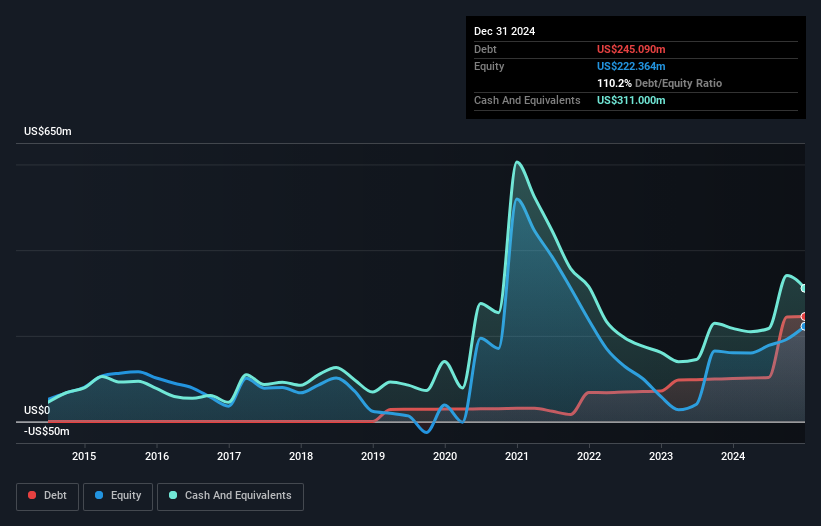Does TG Therapeutics (NASDAQ:TGTX) Have A Healthy Balance Sheet?
Some say volatility, rather than debt, is the best way to think about risk as an investor, but Warren Buffett famously said that 'Volatility is far from synonymous with risk.' So it might be obvious that you need to consider debt, when you think about how risky any given stock is, because too much debt can sink a company. As with many other companies TG Therapeutics, Inc. (NASDAQ:TGTX) makes use of debt. But the more important question is: how much risk is that debt creating?
When Is Debt A Problem?
Debt and other liabilities become risky for a business when it cannot easily fulfill those obligations, either with free cash flow or by raising capital at an attractive price. If things get really bad, the lenders can take control of the business. While that is not too common, we often do see indebted companies permanently diluting shareholders because lenders force them to raise capital at a distressed price. By replacing dilution, though, debt can be an extremely good tool for businesses that need capital to invest in growth at high rates of return. When we examine debt levels, we first consider both cash and debt levels, together.
What Is TG Therapeutics's Debt?
You can click the graphic below for the historical numbers, but it shows that as of December 2024 TG Therapeutics had US$245.1m of debt, an increase on US$100.5m, over one year. However, it does have US$311.0m in cash offsetting this, leading to net cash of US$65.9m.

How Healthy Is TG Therapeutics' Balance Sheet?
The latest balance sheet data shows that TG Therapeutics had liabilities of US$90.7m due within a year, and liabilities of US$264.6m falling due after that. Offsetting these obligations, it had cash of US$311.0m as well as receivables valued at US$129.2m due within 12 months. So it can boast US$84.9m more liquid assets than total liabilities.
Having regard to TG Therapeutics' size, it seems that its liquid assets are well balanced with its total liabilities. So while it's hard to imagine that the US$5.41b company is struggling for cash, we still think it's worth monitoring its balance sheet. Succinctly put, TG Therapeutics boasts net cash, so it's fair to say it does not have a heavy debt load!
View our latest analysis for TG Therapeutics
Notably, TG Therapeutics's EBIT launched higher than Elon Musk, gaining a whopping 103% on last year. There's no doubt that we learn most about debt from the balance sheet. But it is future earnings, more than anything, that will determine TG Therapeutics's ability to maintain a healthy balance sheet going forward. So if you're focused on the future you can check out this free report showing analyst profit forecasts .
Finally, a company can only pay off debt with cold hard cash, not accounting profits. TG Therapeutics may have net cash on the balance sheet, but it is still interesting to look at how well the business converts its earnings before interest and tax (EBIT) to free cash flow, because that will influence both its need for, and its capacity to manage debt. During the last two years, TG Therapeutics burned a lot of cash. While that may be a result of expenditure for growth, it does make the debt far more risky.
Summing Up
While it is always sensible to investigate a company's debt, in this case TG Therapeutics has US$65.9m in net cash and a decent-looking balance sheet. And it impressed us with its EBIT growth of 103% over the last year. So we are not troubled with TG Therapeutics's debt use. There's no doubt that we learn most about debt from the balance sheet. However, not all investment risk resides within the balance sheet - far from it. For instance, we've identified 1 warning sign for TG Therapeutics that you should be aware of.
If you're interested in investing in businesses that can grow profits without the burden of debt, then check out this free list of growing businesses that have net cash on the balance sheet.
Have feedback on this article? Concerned about the content? Get in touch with us directly. Alternatively, email editorial-team (at) simplywallst.com.
This article by Simply Wall St is general in nature. We provide commentary based on historical data and analyst forecasts only using an unbiased methodology and our articles are not intended to be financial advice. It does not constitute a recommendation to buy or sell any stock, and does not take account of your objectives, or your financial situation. We aim to bring you long-term focused analysis driven by fundamental data. Note that our analysis may not factor in the latest price-sensitive company announcements or qualitative material. Simply Wall St has no position in any stocks mentioned.